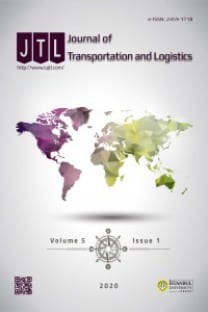Nijerya’daki İmalat Firmalarının Örgütsel Performans ve Elektrik Hizmet Kalitesi Algıları
Elektrik, Hizmet kalitesi, Organizasyonel performans
Manufacturers’ perceived quality of electricity service and organizational performance in Nigeria
Electricity, Service quality, Organizational performance,
___
- Achchuthan, S., Sivathaasan, N., & Jayasundara, J. M. R. S. (2014). Service quality dimensions of electricity services: Evidence from electricity board in Sri Lanka. Asian Social Science, 10(17), 194–203. http://doi.org/10.5539/ass.v10n17p194
- Bagozzi, R. R., & Yi, Y. (1988). On the Evaluation of Structural Equation Models. Journal of Academy of Marketing Science, 16(1), 74 – 94.
- Cassel, C., Hackl, P., & Westlund, A. H. (1999). Robustness of partial least-squares method for estimating latent variable quality structures. Journal of Applied Statistics, 26(4), 435–446. http://doi.org/10.1080/02664769922322
- Dado, J., Petrovicova, J. T., Riznic, D., & Rajic, T. (2011). An empirical investigation into the construct of higher education service quality. International Review of Management and Marketing, 1(3), 30–42.
- Dzobo, O., & Herman, R. (2012). Reliability worth assessment of electricity consumers : a South African case study. Journal of Energy in Southern Africa, 23(3), 31–39.
- Fornell, C., & Larcker, D. F. (1981). Evaluating Structural Equation Models with Unobservable Variables and Measurement Error. Journal of Marketing Research, 18(1), 39 – 50. http://doi.org/10.1017/CBO9781107415324.004
- Gado, N. D., & Nmadu, T. M. (2012). The Performance of Textile Companies in the North West Zone of Nigeria: the Role of Infrastructure as a Resource. International Journal of Human Resource Studies, 2(1), 89–100. http://doi.org/10.5296/ijhrs.v2i1.1259
- Geetika, S. N. (2010). Determinants of Customer Satisfaction on Service Quality : A Study of Railway Platforms in India. Journal of Public Transportation, 13(1), 97–113.
- Gholami, R., Sulaiman, A. B., Ramayah, T., & Molla, A. (2013). Senior managers’ perception on green information systems (IS) adoption and environmental performance: Results from a field survey. Information & Management, 50(7), 431–438. http://doi.org/10.1016/j.im.2013.01.004
- Gilbert, E., Harry, C., & Gombachika, S. . (2013). Service quality, customer satisfaction and loyalty among industrial customers of a public electricity utility in Malawi. International Journal of Energy Sector Management, 7(2), 269 – 282.
- Grönroos, C. (2001). The Perceived Service Quality Concept – A Mistake? Managing Service Quality, 11(3), pp. 150–152. http://doi.org/10.1108/09604520110393386
- Hair, J. F., Ringle, C. M., & Sarstedt, M. (2011). PLS-SEM: Indeed a Silver Bullet. The Journal of Marketing Theory and Practice, 19(2), 139–152. http://doi.org/10.2753/MTP1069-6679190202
- Hair Jr, J. F., Sarstedt, M., Hopkins, L., & Kuppelwieser, V. G. (2014). Partialleast squares structural equation modeling (PLS-SEM): An emerging tool in business research. European Business Review, 26(2), 106 – 121.
- Hensher, D. A., Shore, N., & Train, K. (2014). Willingness to pay for residential electricity supply quality and reliability. Applied Energy, 115, 280–292. http://doi.org/10.1016/j.apenergy.2013.11.007
- Hoque, Z. (2005). Linking environmental uncertainty to non-financial performance measures and performance: a research note. The British Accounting Review, 37(4), 471–481. http://doi.org/10.1016/j.bar.2005.08.003
- Joseph, I. O. (2014). Issues and challenges in the Privatized Power Sector in Nigeria. Journal of Sustainable Development Studies, 6(1), 161–174.
- Kim, J., & Han, W. (2012). Improving Service Quality in Long-term Care Hospitals: National Evaluation on Long-term Care Hospitals and Employees Perception of Quality Dimensions. Osong Public Health and Research Perspectives, 3(2), 94–99. http://doi.org/10.1016/j.phrp.2012.04.005
- Mike, J. A. (2010). Banking Sector Reforms and the Manufacturing Sector: The Manufacturers ‘ Association of Nigeria Perspective. Central Bank of Nigeria Economic and Financial Review, 46(4), 57–65.
- Moon, Y. J. (2013). The tangibility and intangibility of e-service quality. International Journal of Smart Home, 7(5), 91–102. http://doi.org/10.14257/ijsh.2013.7.5.10
- Murphy, G. B., Trailer, J. W., & Hill, R. C. (1996). Measuring performance in entrepreneurship research. Journal of Business Research, 36(1), 15–23. http://doi.org/10.1016/0148-2963(95)00159-X
- Nandakumar, M. K., Ghobadian, A., & O’Regan, N. (2010). Business-level strategy and performance: The moderating effects of environment and structure. Management Decision, 48(6), 907–939. http://doi.org/10.1108/00251741011053460
- Ramaiyah, a, Md. Zain, a N., & Ahmad, H. (2007). Exploring the dimensions of service quality in higher education research. Regional Conference on Quality in Higher Education.
- Rasoolimanesh, S. M., Dahalan, N., & Jaafar, M. (2016). Tourists’ perceived value and satisfaction in a community-based homestay in the Lenggong Valley World Heritage Site. Journal of Hospitality and Tourism Management, 26, 72–81. http://doi.org/10.1016/j.jhtm.2016.01.005
- Reinartz, W., Haenlein, M., & Henseler, J. (2009). An empirical comparison of the efficacy of covariance-based and variance- based SEM. International Journal of Market Research, 26(4), 332–344.
- Rekettye, G., & Pinter, J. (2006). Customer satisfaction and price acceptance in the case of electricity supply. International Journal of Process Management and Benchmarking, 1(x), 220. http://doi.org/10.1504/IJPMB.2006.010858
- Satapathy, S. (2014). An analysis for service quality enhancement in electricity utilitysector of India by SEM. Benchmarking: An International Journal, 21(6), 964 – 986.
- Senarat, U., & Gunawardena, N. S. (2011). Development of an instrument to measure patient perception of the quality of nursing care and related hospital services at the national hospital of Sri Lanka. Asian Nursing Research, 5(2), 71–80. http://doi.org/10.1016/S1976-1317(11)60015-7
- Wetzels, M., Odekerken-Schröder, G., & van Oppen, C. (2009). Using PLS path modeling for assessing hierarchical construct models: Guidelines and Empirical Illustration. MIS Quarterly, 33(1), 177–195. http://doi.org/Article
- Yeap, J., T., R., & Soto-Acosta, P. (2016). Factors propelling the adoption of m-learning among students in higher education. Electronic Markets, 1–16. http://doi.org/10.1007/s12525-015-0214-x
- Zhang, Y., Liu, L., Chen, H., Wang, J., & Zeng, M. (2009). External Evaluation Model of Power Supply Service Quality Based on Service Blueprint Theory. 2009 International Conference on Management and Service Science, 3–6. http://doi.org/10.1109/ICMSS.2009.5300822
- Yayın Aralığı: 2
- Başlangıç: 2015
- Yayıncı: İstanbul Üniversitesi
Nijerya’daki İmalat Firmalarının Örgütsel Performans ve Elektrik Hizmet Kalitesi Algıları
Abdulrahman MUHAMMED, Lamidi YUSUF
İç Liman-Liman Sistem Geliştirme: Ürün Yaşam Döngüsü Uygulaması
Bentaleb FATİMAZAHRA, Mouhsene FRİ, Charif MABROUKİ, Alami SEMMA
Furkan YENER, Harun Reşit YAZGAN, Serap ERCAN CÖMERT, Sena KIR, Yağmur KAYA
